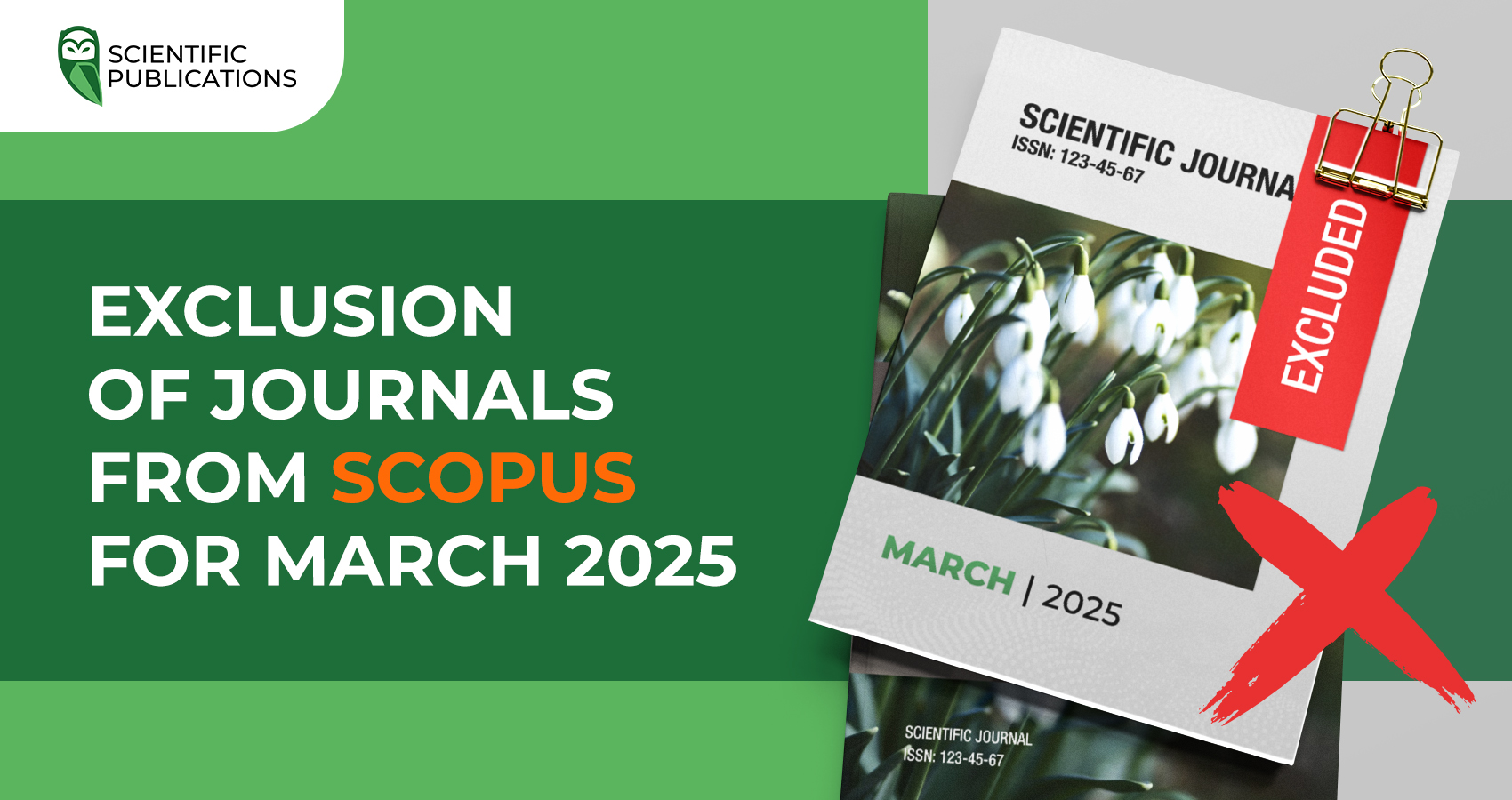Traditionally, Scientific Publications has prepared an up-to-date list of journals that have been excluded from the Scopus database. Please find below a list of scientific publications that lost their indexation due to non-compliance with the database standards in March 2025.

Reasons for excluding journals from the Scopus database
Scopus is one of the most reputable and prestigious databases that indexes high-quality scientific research and journals. The platform's expert committee regularly checks and determines whether the publications meet the established criteria. In addition, the commission excludes those journals that no longer meet the standards. There are several reasons why a publication may lose its indexation.
The main reasons for excluding a journal from Scopus
- Poor quality of publications. Journals that publish materials of limited scientific significance or insignificant contribution to the development of the research field risk being excluded from indexing.
- Failure to comply with the principles of academic integrity. The detection of plagiarism or self-plagiarism may be a good reason to terminate cooperation with the platform.
- Poor scientometric indicators. The Scopus Radar monitoring system detects suspicious trends, such as a sharp increase in the number of articles or references, which may signal manipulation.
- Violation of quality requirements. If a journal does not comply with Scopus standards, has an inadequate peer review system, or publishes papers without an adequate level of scientific novelty, this may be grounds for removal.
- Changes in editorial policy. Reducing the content requirements or shifting the focus to other research areas that do not meet the stated criteria can also lead to the loss of indexing.
The main reason for the exclusion of journals from the Scopus database is the insufficient quality of publications. The Radar system, which automatically monitors all indexed publications, is responsible for identifying such problems. It collects and analyses information on the number of articles and their citation level, recording abnormal changes, such as a sudden increase in publication activity or citations. This tool provides continuous monitoring of scientific content, which allows Scopus to maintain high quality standards.
In March 2025, 11 journals lost their indexation at once. The list of excluded publications can be found in the table below.
List of excluded scientific journals for March 2025
| № | Scientific journal | ISSN / eISSN | Reasons for exclusion |
| 1 | Communications on Applied Nonlinear Analysis | – 1074-133X |
Publication Concerns |
| 2 | Indonesian Journal of Electrical Engineering and Computer Science | 2502-4752 2502-4760 |
Publication Concerns |
| 3 | International Journal of Electrical and Computer Engineering | – 2088-8708 |
Publication Concerns |
| 4 | International Journal of Reconfigurable and Embedded Systems | 2089-4864 2722-2608 |
Publication Concerns |
| 5 | Journal of Advanced Research in Applied Sciences and Engineering Technology | – 2462-1943 |
Publication Concerns |
| 6 | Journal of Pharmacy and Bioallied Sciences | 0976-4879 0975-7406 |
Publication Concerns |
| 7 | Latin American Journal of Pharmacy | 0326-2383 2362-3853 |
Radar |
| 8 | MCB Molecular and Cellular Biomechanics | 1556-5297 1556-5300 |
Publication Concerns |
| 9 | Panamerican Mathematical Journal | 1064-9735 – |
Publication Concerns |
| 10 | Review of Clinical Pharmacology and Pharmacokinetics, International Edition | 1011-6583 – |
Radar |
| 11 | Telkomnika (Telecommunication Computing Electronics and Control) | 1693-6930 2087-278X |
– |
* The official report from Scopus does not contain information on the reasons for the exclusion of the journal Telkomnika (Telecommunication Computing Electronics and Control).
Checking the indexing of a scientific journal
Publication in Scopus-indexed journals is a complex process that requires significant time and financial costs. Before submitting an article, it is important to make sure that the journal is reliable. This is due to several key factors:
- Protection against dubious journals. Publications that once had a good reputation may be removed from the Scopus database due to non-compliance with ethical standards.
- Preservation of scientific reputation. Publication in excluded journals can negatively affect the image of a scientist.
- Limited scientometric efficiency. Studies published in such journals usually have a lower citation rate and lose visibility in the global scientific community.
To avoid risks, Scientific Publications regularly provides updated information on journals excluded from Scopus, which allows researchers to plan their publication activities with confidence.
If you need help choosing a journal or publishing a scientific article in the Scopus database, contact Scientific Publications. We guarantee you successful publication and indexing. Do you have any questions? Get a free consultation with our manager by filling out the form below. Together to new achievements!





